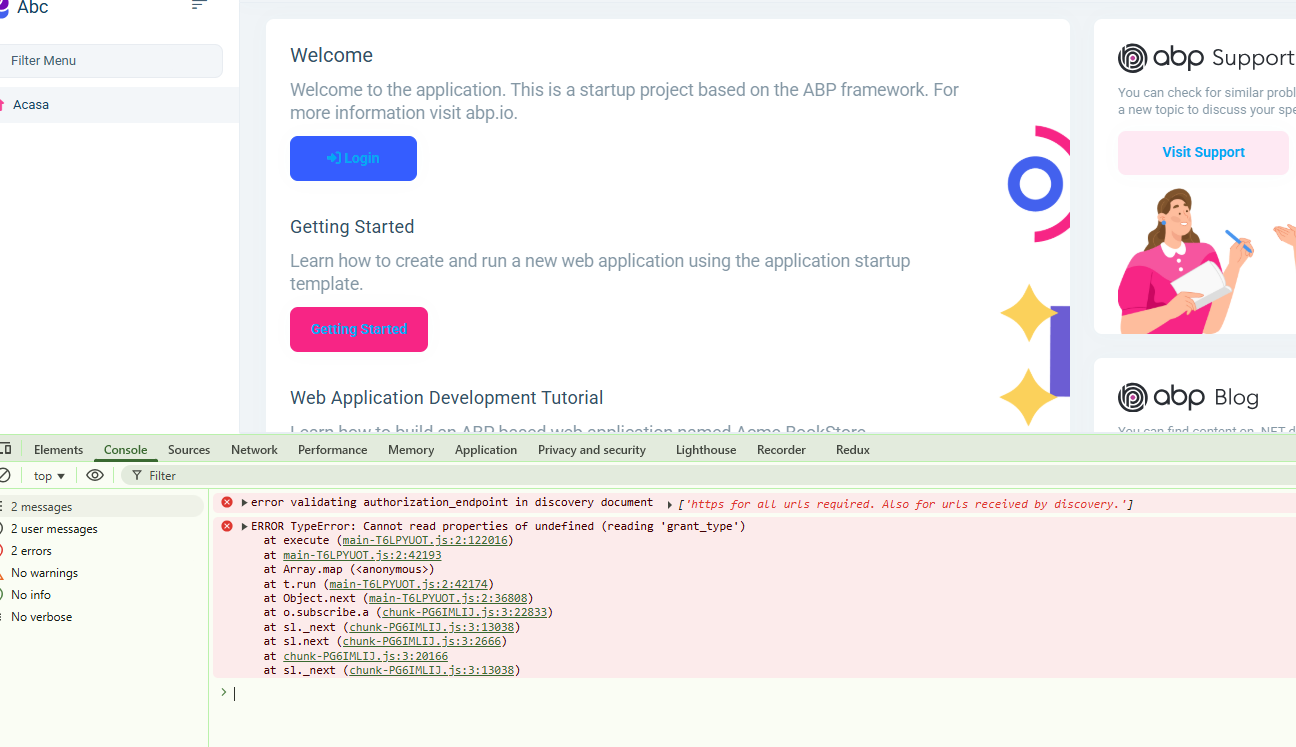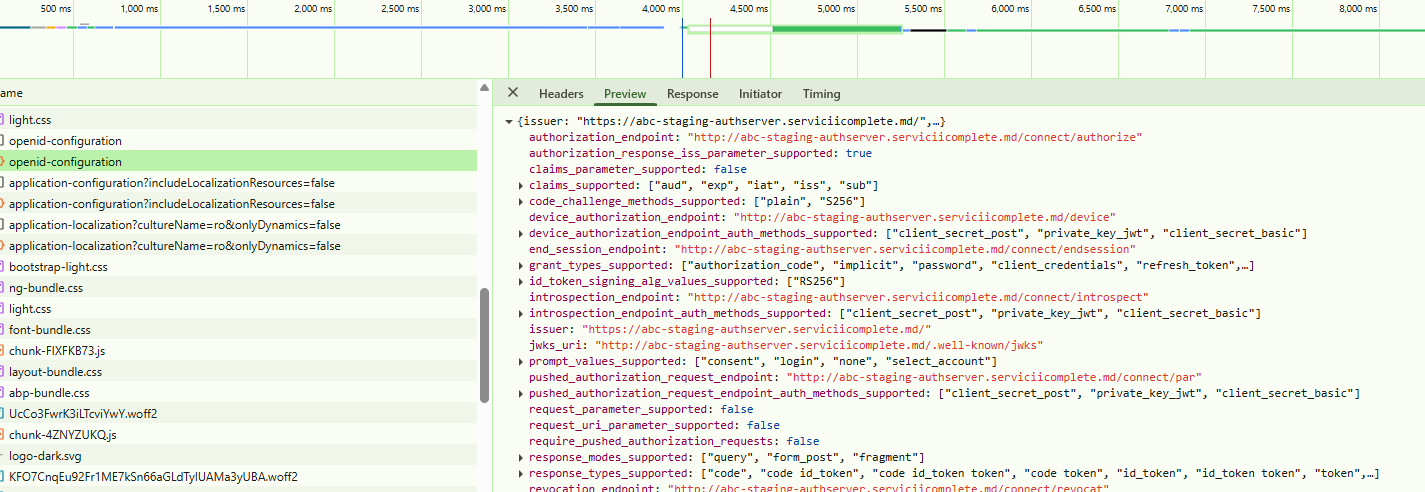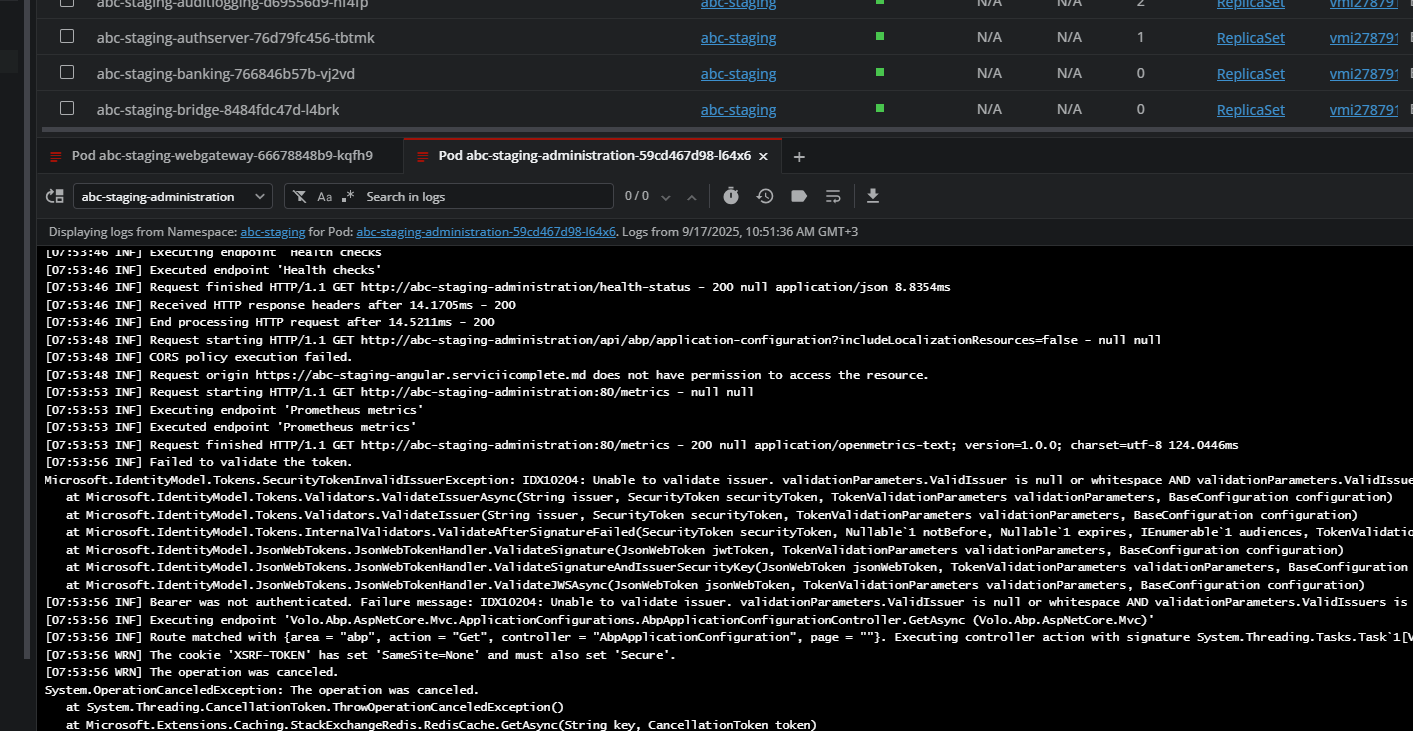- Template: microservice
- Created ABP Studio Version: 0.9.26
- Current ABP Studio Version: 1.2.2
- Multi-Tenancy: Yes
- UI Framework: angular
- Theme: leptonx
- Theme Style: system
- Run Install Libs: Yes
- Database Provider: ef
- Database Management System: sqlserver
- Mobile Framework: none
- Public Website: No
- Include Tests: Yes
- Dynamic Localization: Yes
- Kubernetes Configuration: Yes
- Grafana Dashboard: Yes
- Use Local References: No
- Optional Modules:
- GDPR
- FileManagement
- TextTemplateManagement
- AuditLogging
- Chat
- OpenIddictAdmin
Hi,
When I deployed to Kubernetes cluster I am receiving the following errors:
Any ideas?
11 Answer(s)
-
0
The error message in your screenshot indicates an issue with the OpenID Connect discovery document, specifically: "error validating authorization_endpoint in discovery document ['https for all urls required. Also for urls received by discovery.']". This means that all URLs in your OpenIddict/OpenID Connect configuration must use HTTPS, and any endpoints returned by the discovery document must also be HTTPS.
This is a common issue when deploying ABP microservice solutions to Kubernetes or other environments where HTTPS is enforced.
Steps to resolve:
Ensure all URLs in your appsettings and environment variables use HTTPS, not HTTP. This includes:
- AuthServer:Authority
- AuthServer:MetaAddress
- IdentityClients:Default:Authority
- RemoteServices:...:BaseUrl
Make sure your Kubernetes ingress/controller is configured to serve HTTPS and that your certificates are valid.
In your OpenIddict server configuration, set the issuer to the correct HTTPS URL:
PreConfigure<OpenIddictServerBuilder>(builder => { builder.SetIssuer(new Uri(configuration["AuthServer:Authority"])); // Should be HTTPS });If you are using self-signed certificates for local development, ensure your browser trusts them. For production, use a valid certificate authority.
After making these changes, clear your browser cache and tokens.
For more details and troubleshooting steps, see:
- ABP Support: Angular Front-End Redirect Auth Issue Kubernetes Deployment
- ABP Support: Angular Front-End Redirect Auth Issue Kubernetes Deployment (related)
These steps should resolve the "https for all urls required" error and allow your ABP Angular application to authenticate correctly in Kubernetes.
Sources:
- https://abp.io/support/questions/6033
- https://abp.io/support/questions/5701
This response was generated by AI. If it didn’t solve your problem, feel free to post a new answer — our support team will jump in to help you soon.
-
0
I think I need a human assistance
-
0
hi
Are you using
HTTPas the authserve scheme?Can you try to set
requireHttpstofalseinoAuthConfigconst oAuthConfig = { issuer: 'http://abp.io/', redirectUri: baseUrl, clientId: 'Bluestar_App', responseType: 'code', scope: 'offline_access Bluestar', requireHttps: false, };Thanks.
-
0
-
0
hi
Please set the issuer, and add a middleware to set
ctx.Request.SchemetoHTTPSpublic override void PreConfigureServices(ServiceConfigurationContext context) { PreConfigure<OpenIddictServerBuilder>(serverBuilder => { serverBuilder.AddProductionEncryptionAndSigningCertificate("openiddict.pfx", configuration["AuthServer:CertificatePassPhrase"]!); serverBuilder.SetIssuer(new Uri(configuration["AuthServer:Authority"]!)); }); }public override void OnApplicationInitialization(ApplicationInitializationContext context) { var app = context.GetApplicationBuilder(); var env = context.GetEnvironment(); app.Use((ctx, next) => { /* This application should act like it is always called as HTTPS. * Because it will work in a HTTPS url in production, * but the HTTPS is stripped out in Ingress controller. */ ctx.Request.Scheme = "https"; return next(); }); -
0
-
0
hi
Can you confirm your
Administration servicecan communicate with theauthserverwebsite?https://abp.io/community/articles/common-errors-in-jwt-bearer-authentication-4u3wrbs5#gsc.tab=0
Thanks
-
0
Hi,
As you can see the error is IDX10204: Unable to validate issuer. validationParameters.ValidIssuer is null or whitespace AND validationParameters.ValidIssuers is null or empty. Obviously is something wrong in their communication, Sincerely speaking I am using abp provided helm files without any modification, just put it my domains. Do you have any sample application deployed to the external production Kubernetes cluster, just for me to compare helm manifests?
-
0
hi
Can you add the code below to your
Administration serviceto see the error?public async static Task<int> Main(string[] args) { IdentityModelEventSource.ShowPII = true; IdentityModelEventSource.Logger.LogLevel = EventLevel.Verbose; var wilsonTextLogger = new TextWriterEventListener("Logs/identitymodel.txt"); wilsonTextLogger.EnableEvents(IdentityModelEventSource.Logger, EventLevel.Verbose);Thanks
-
0
-
0
Thanks. I will check and update
helmin the template.

































































